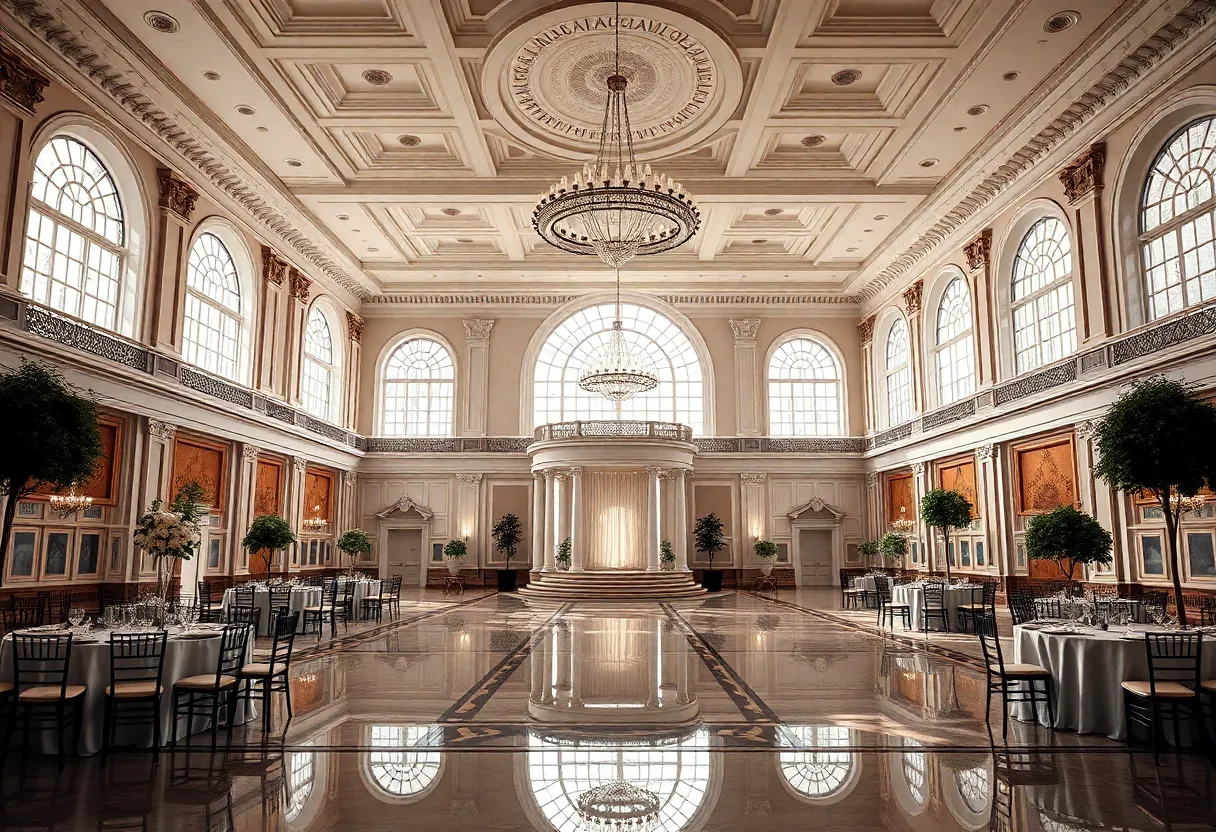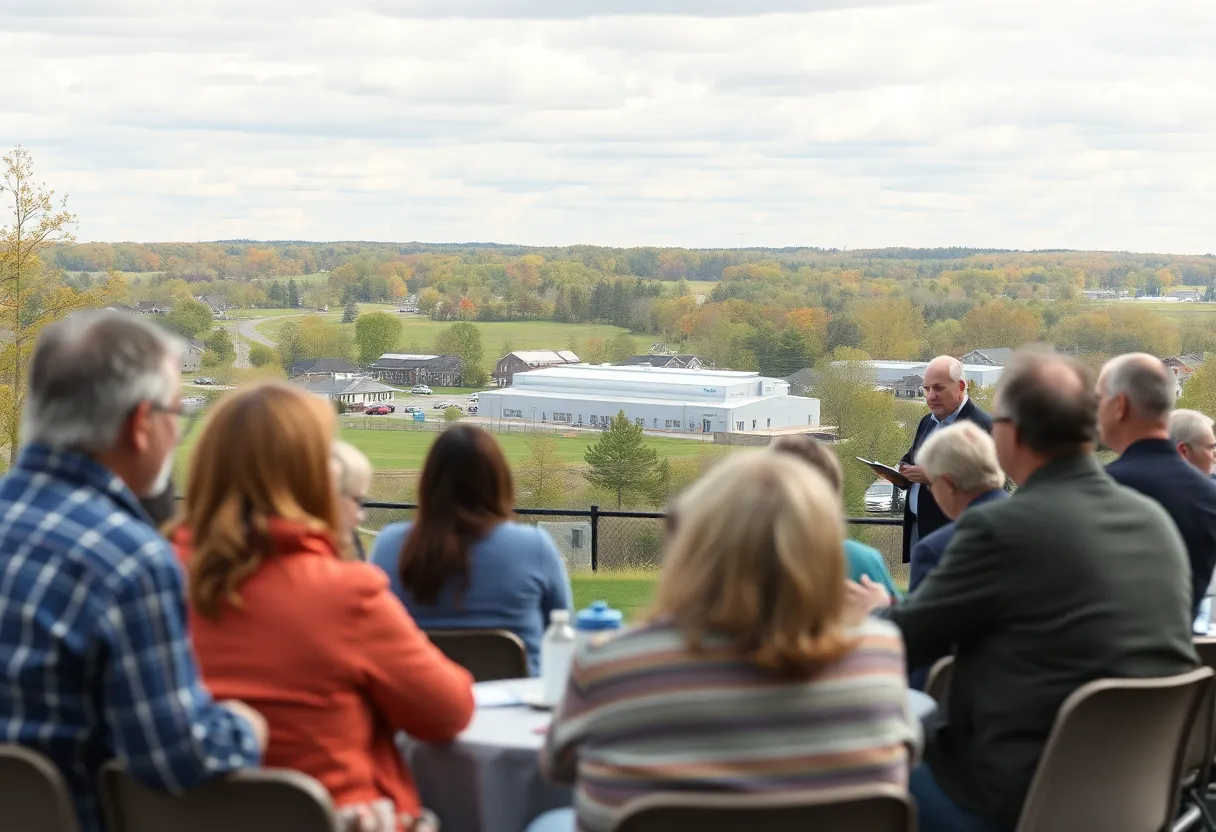Washington, D.C., October 21, 2025
Demolition has commenced on sections of the White House East Wing to create a new grand ballroom for President Trump. The project is being managed under tight security, focusing on enhancing event hosting capabilities while ensuring the preservation of historical elements. This initiative reflects the administration’s commitment to modernizing the venue for high-profile events.
Demolition Begins on White House East Wing for New Ballroom
Washington, D.C. – Demolition has commenced on part of the White House East Wing to construct a grand ballroom for President Trump. The project, overseen with strict security, aims to enhance event hosting capabilities while preserving historical elements.
Project Overview
The new ballroom is a 90,000-square-foot glass-walled structure designed to accommodate up to 999 guests, significantly surpassing the East Room’s 200-person capacity. The project is privately funded, with contributions from President Trump and various donors, including Carrier Global Corp., which is providing the HVAC system. The total cost is estimated at over $250 million. The ballroom is expected to be completed before the end of President Trump’s term in January 2029.
Demolition Details
Demolition crews began dismantling parts of the East Wing’s façade, including sections of the roof, entryway, and windows. The East Wing, constructed in 1902 and last modified in 1942, has traditionally housed the First Lady’s offices. Despite initial assurances that the new structure would not interfere with the existing building, the demolition indicates a significant alteration to the historic site.
Historical Significance
The East Wing has served as the First Lady’s base of operations since its construction. The planned ballroom represents the most significant structural change to the White House since the Truman Balcony in 1948. President Trump has emphasized that the new addition will respect the existing building, stating it will be “near it, but not touching it,” and will “pay total respect to the existing building.”
Security Measures
The demolition and construction are being conducted under strict security protocols to ensure the safety of the site and personnel involved. The project is being overseen by the U.S. Secret Service, which is implementing enhanced security features as part of the renovation.
Public Reaction
The commencement of demolition has drawn mixed reactions. Some view the project as a necessary modernization, while others express concern over the alteration of a historic landmark. The White House has stated that the project will be completed with zero cost to the American taxpayer, as it is being privately funded.
Frequently Asked Questions (FAQ)
What is the purpose of the demolition on the White House East Wing?
The demolition is part of a project to construct a new grand ballroom for President Trump, aiming to enhance event hosting capabilities while preserving historical elements.
How large is the new ballroom?
The new ballroom is a 90,000-square-foot glass-walled structure designed to accommodate up to 999 guests, significantly surpassing the East Room’s 200-person capacity.
Who is funding the construction of the ballroom?
The project is privately funded, with contributions from President Trump and various donors, including Carrier Global Corp., which is providing the HVAC system. The total cost is estimated at over $250 million.
What is the historical significance of the East Wing?
The East Wing has served as the First Lady’s base of operations since its construction in 1902. The planned ballroom represents the most significant structural change to the White House since the Truman Balcony in 1948.
What security measures are in place for the construction?
The demolition and construction are being conducted under strict security protocols to ensure the safety of the site and personnel involved. The project is being overseen by the U.S. Secret Service, which is implementing enhanced security features as part of the renovation.
How has the public reacted to the demolition?
The commencement of demolition has drawn mixed reactions. Some view the project as a necessary modernization, while others express concern over the alteration of a historic landmark. The White House has stated that the project will be completed with zero cost to the American taxpayer, as it is being privately funded.
Key Features of the White House Ballroom Project
| Feature | Details |
|---|---|
| Size | 90,000-square-foot glass-walled structure |
| Capacity | Accommodates up to 999 guests |
| Funding | Privately funded by President Trump and various donors, including Carrier Global Corp. |
| Cost | Estimated at over $250 million |
| Completion Date | Before the end of President Trump’s term in January 2029 |
| Historical Significance | Most significant structural change to the White House since the Truman Balcony in 1948 |
| Security Measures | Overseen by the U.S. Secret Service with enhanced security features |
Deeper Dive: News & Info About This Topic
HERE Resources
Michigan Allocates $14 Million for Road Repairs in Genesee County
Miami Sees Surge in Residential Construction
Looming Government Shutdown Threatens Federal Construction Projects
White House Ballroom Construction Advances Despite Shutdown
Author: Construction MI News
MICHIGAN STAFF WRITER The MICHIGAN STAFF WRITER represents the experienced team at constructionminews.com, your go-to source for actionable local news and information in Michigan and beyond. Specializing in "news you can use," we cover essential topics like product reviews for personal and business needs, local business directories, politics, real estate trends, neighborhood insights, and state news affecting the area—with deep expertise drawn from years of dedicated reporting and strong community input, including local press releases and business updates. We deliver top reporting on high-value events such as the Michigan Build Expo, major infrastructure projects, and advancements in construction technology showcases. Our coverage extends to key organizations like the Associated Builders and Contractors of Michigan and the Home Builders Association of Michigan, plus leading businesses in construction and legal services that power the local economy such as CMiC Global and Miller Canfield LLP. As part of the broader network, including constructioncanews.com, constructionnynews.com, and constructiontxnews.com, we provide comprehensive, credible insights into the dynamic construction landscape across multiple states.





